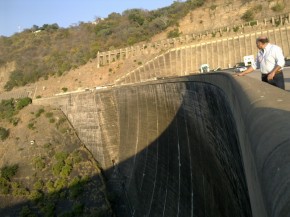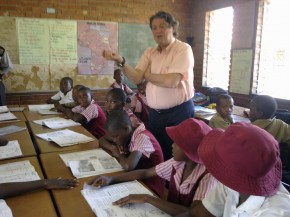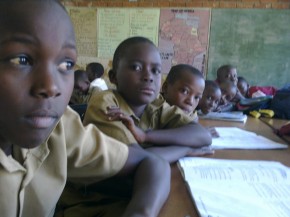
Tuesday morning found me sitting on the proverbial 'dock of the bay', waiting for a speedboat to emerge from the calm blue horizon of Lake Kariba - a massive man-made lake formed 50 years ago by damming the mighty Zambezi river. We waited for Mr Melendro - our senior regional European Commission manager from Brussels, who had been visiting a wildlife conservancy programme in the nearby Matusadona National Park. The calm in the bay was deceptive - a fresh wind was blowing out in the main lake, and an hour later the boat finally arrived, with our visitor "shaken but not stirred" in finest '007' style.
Our mission was to demonstrate the impact of the European Union's support to basic health and education services over Zimbabwe's tempestuous recent past. First we visited the ageing district hospital perched on top of a hilltop overlooking the lake. The resourceful District Medical Officer (DMO) described the challenges faced five years ago when hyper-inflation ran riot, supply chains ceased to function and staff couldn't afford to feed themselves, let alone travel to clinics.

The EU emergency support programmes stepped up the purchase and supply of essential medicines to combat TB, malaria and other common tropical infections but, even more importantly, it paid retention allowances to top up salaries and limit the 'brain drain' of doctors and nurses.
Paying salary-related allowances to government workers from aid funds is often considered taboo due to fiscal sustainability and other policy related issues, but it was impossible to dispute the need. This vast remote district of 70,000 people had only one qualified doctor - the DMO. As a result, Kariba's other modern rural hospital had none and could offer only basic primary care. Its operating theatre went unused, leading to referrals, for example, of emergency C-sections to a hospital over 100km away - journeys that some women did not survive.
The district education officer, Mr Karambwe, and the head teacher, Mr Kashiri, of Nymahunga Primary School described similar supply and sustainability issues at this large lakeside school catering to over 1800 children. Described as a 'minor problem' were the gaps in the perimeter wall that at flood times allowed small crocodiles and hippos into the compound at night!

The Education Transition Fund programme supported by the EU, DFID and many other development partners had in 2010/11 supplied this school - and nationwide all the other 5700+ primary schools - with textbooks in the four core subjects, allowing much more effective learning in the congested double-shift classrooms. The head was pleased to report that in the end of primary exams the pass rate had jumped 7% following the arrival of the books. A fact he attributed entirely to the books and their motivational effects on teachers and students alike.
Only about one-third of the estimated 300 orphans and vulnerable children at the school had received support from the Zimbabwean government's BEAM programme that covers the kids' US$100 a year school fees. The school development association undertook to keep all the poorer children in school, but this was clearly a struggle. The renowned Zimbabwean author Petina Gappah has eloquently described the dilemmas that most schools face in making ends meet. In her recent essay published in Guernica magazine, she revisits her childhood haunts and describes the trials and tribulations of getting and education in today's Zimbabwe.
The situation was much worse in the remote rural areas - no parallel teacher salary supplements were provided due to the much larger volumes involved. Overall, only one third of the district's teachers are qualified, the rest are under-qualified contract teachers on much lower pay scales, who in some cases constitute the entire staff compliment of rural satellite schools. This has led to district-wide pass rates of only 20% at end of primary and shockingly 6% at "O" level (grade 10).
Given both Zimbabwe's impressive past achievements in developing its human potential and its unresolved political dilemmas, it is sometimes difficult to make a case for supporting the country. Hopefully we were able to present some compelling evidence of the need for a pragmatic approach, to continue support to this marvellous country until 'calm waters' once more return!

2 comments
Comment by Judith Garaba posted on
Ian I am doing a contact list for the Vice Chancellor of the University of Zimbabwe and I realise you are the person dealing with Education in IMF.
Please could I have your e-mail address
Comment by Ian Attfield posted on
Judith,
To clarify I work in the EU delegation office in Harare, not the IMF.
best
Ian